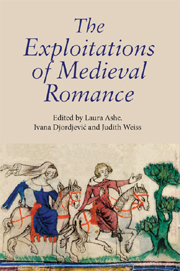Book contents
- Frontmatter
- Contents
- Preface
- Notes on Contributors
- Abbreviations and Editorial Note
- Introduction
- 1 The Fairies in the Fountain: Promiscuous Liaisons
- 2 Saracens and Other Saxons: Using, Misusing, and Confusing Names in Gui de Warewic and Guy of Warwick
- 3 The Exploitation of Ideas of Pilgrimage and Sainthood in Gui de Warewic
- 4 Chanson de geste as Romance in England
- 5 Patterns of Availability and Demand in Middle English Translations de romanz
- 6 Reading a Christian–Saracen Debate in Fifteenth-Century Middle English Charlemagne Romance: The Case of Turpines Story
- 7 Subtle Crafts: Magic and Exploitation in Medieval English Romance
- 8 Meeting Grounds: Gardens in Middle English Romance
- 9 ‘Als for the worthynes of þe romance’: Exploitation of Genre in the Buik of Kyng Alexander the Conquerour
- 10 Sir Gawain and the Green Knight and the Limits of Chivalry
- Index of Manuscripts
- General Index
Introduction
Published online by Cambridge University Press: 12 September 2012
- Frontmatter
- Contents
- Preface
- Notes on Contributors
- Abbreviations and Editorial Note
- Introduction
- 1 The Fairies in the Fountain: Promiscuous Liaisons
- 2 Saracens and Other Saxons: Using, Misusing, and Confusing Names in Gui de Warewic and Guy of Warwick
- 3 The Exploitation of Ideas of Pilgrimage and Sainthood in Gui de Warewic
- 4 Chanson de geste as Romance in England
- 5 Patterns of Availability and Demand in Middle English Translations de romanz
- 6 Reading a Christian–Saracen Debate in Fifteenth-Century Middle English Charlemagne Romance: The Case of Turpines Story
- 7 Subtle Crafts: Magic and Exploitation in Medieval English Romance
- 8 Meeting Grounds: Gardens in Middle English Romance
- 9 ‘Als for the worthynes of þe romance’: Exploitation of Genre in the Buik of Kyng Alexander the Conquerour
- 10 Sir Gawain and the Green Knight and the Limits of Chivalry
- Index of Manuscripts
- General Index
Summary
Literature resists being used, because it has no use; it makes no assertions, it claims no authority, nor does it subvert authority, because that would be to substitute one kind of truth-claim for another. In place of propositional statement, it offers self-conscious verbal play, in place of logic, rhetoric, and in place of truth, fiction.
Derek Pearsall's 2004 salvo against the furthest reaches of historicist criticism expresses, with characteristic brio, the dangers of reading literature solely in terms of its complicity with – and creation and instantiation of – cultural and political ideologies. But as one might expect in a volume entitled The Exploitations of Romance, I would respond with some equivocation. The text's claim to fictionality is itself ideological; it demands imaginative freedoms and resists truth-telling responsibilities, while nevertheless insisting upon the audience's participation in its inherent presuppositions and preoccupations. Pearsall makes a vital point, that it is not always possible to produce convincing, historicized readings of literary texts; their freedom from immediate reference is, one could say, the heart of their poetic value. But prevailing fictions evolve over time. Behind the changing meanings of the stories we tell ourselves lie the reasons for their being told; where the attempt to historicize an individual text lacks purchase, the relations between texts can offer access: to the operations being performed upon received material, the moments of heat and invention, and the transmission of social and cultural meaning in the text.
- Type
- Chapter
- Information
- The Exploitations of Medieval Romance , pp. 1 - 14Publisher: Boydell & BrewerPrint publication year: 2010



